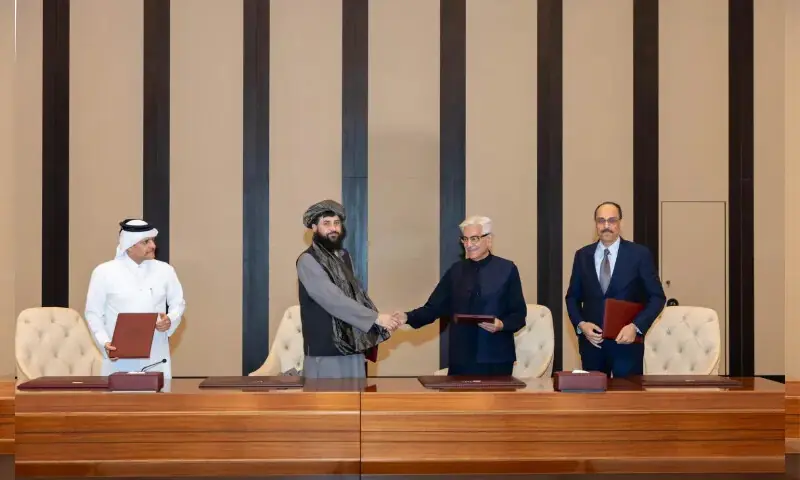Hafiz Mudassir Ahmad
After more than a week of fierce hostilities and some of the most intense military exchanges between Pakistan and Afghanistan since 2021, a fragile calm has been restored along the border. The breakthrough came in Doha, where representatives of both countries agreed on a long-term ceasefire early Sunday, pledging to pursue diplomacy and find a sustainable solution to cross-border terrorism.
Mediated by Qatar and Turkiye, the truce has opened a narrow window for peace in a region that has been teetering on the edge of escalation. The next phase of talks is scheduled in Istanbul, where Afghan and Pakistani officials are expected to negotiate a monitoring framework to ensure the ceasefire’s durability and prevent future violations.
Follow Republic Policy on YouTube
Once bound by shared ideology and strategic cooperation, Islamabad and Kabul’s relationship has deteriorated sharply since the Afghan Taliban returned to power in August 2021. At the heart of the conflict lies the Tehreek-e-Taliban Pakistan (TTP) — a militant outfit that has resurged under Taliban rule, launching hundreds of cross-border attacks inside Pakistan.
Islamabad has long accused Kabul of harboring and facilitating terrorist groups that operate against Pakistan. The Taliban, however, continue to deny these allegations despite overwhelming evidence — including intelligence reports, confessions, and intercepted communications — proving that TTP operatives enjoy safe havens in Afghan territory.
Follow Republic Policy on X (Twitter)
Over the past year, Pakistan has witnessed more than 600 militant attacks, claiming the lives of dozens of security personnel. Earlier attempts at reconciliation, including several rounds of talks mediated by Afghan clerics and tribal elders, collapsed without results. In response, Pakistan’s armed forces carried out targeted strikes on militant sanctuaries inside Afghanistan — a move that escalated tensions but also served as a strategic warning to Kabul.
While these operations sent a clear message of deterrence, military confrontation alone cannot resolve a problem deeply embedded in the political and ideological complexities of the Afghan Taliban’s governance. Prolonged conflict risks destabilizing both states and could drag the region into a new spiral of violence at a time when South Asia can least afford it.
Follow Republic Policy on Facebook
Experts at Republic Policy argue that Pakistan’s best option lies in a dual-track strategy — combining firm deterrence with persistent diplomacy. Military operations may suppress militant threats temporarily, but only dialogue can institutionalize peace. The Doha ceasefire, therefore, represents not an end but a new beginning in Pakistan’s quest for secure borders and regional stability.
After the Doha talks, the Taliban’s spokesperson announced that no further hostile actions would be taken against Pakistan. Similar commitments were made in previous engagements — including the Beijing trilateral talks — but without lasting impact. This time, however, Islamabad insists on a verifiable monitoring mechanism, a system that can confirm compliance on both sides and ensure that cross-border sanctuaries are dismantled.
Follow Republic Policy on TikTok
Foreign Minister Ishaq Dar has emphasized that Pakistan’s patience has limits. He stated that peace can only be sustained if Afghanistan prevents militant groups, particularly the TTP and its affiliates, from staging attacks on Pakistani soil. Dar underscored that the Taliban, as the de facto rulers of Afghanistan, are responsible under international norms for ensuring that their territory is not used to destabilize neighboring states.
While groups like Al Qaeda or the TTP might heed Taliban directives, extremist outfits such as the Islamic State-Khorasan (IS-K) remain a major threat, operating autonomously and often targeting both Kabul and Islamabad. Hence, the Taliban must demonstrate effective control over their borders if they seek legitimacy and lasting peace.
Follow Republic Policy on Instagram
Regional analysts believe that the Doha truce could mark a turning point — but only if it is backed by verifiable actions and sustained engagement. The role of Qatar, Turkiye, and potentially China will be crucial in guaranteeing compliance and mediating any disputes that arise during implementation.
For Pakistan, the goal remains clear: to protect its people, maintain border stability, and prevent the return of large-scale terrorism. For Afghanistan, peace with Pakistan is vital for its own stability, trade, and international recognition. The choice for both nations is stark — confrontation or coexistence.
If the current calm is nurtured through credible diplomacy, cooperation, and regional mediation, the fragile truce forged in Doha may yet evolve into a foundation for lasting peace in one of the world’s most volatile regions.
















